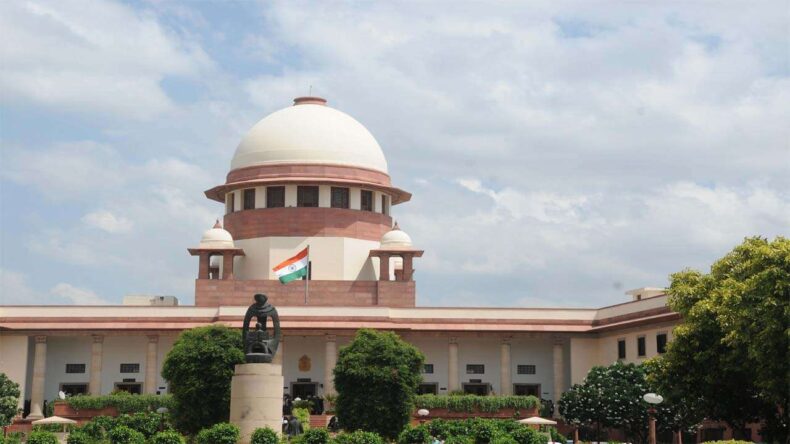The Supreme Court ordered the Centre and states to halt all pending trials, appeals, and actions related to the charge of sedition established under Section 124A of the Indian Penal Code (IPC) until the central government completes the stated procedure to review and re-examine the provision.

Sedition Law
Whoever by words, either spoken or written, or by signs, or by visible representation, or attempts to bring contempt or hatred or attempts disaffection towards the government shall be facing imprisonment for life or extended punishment to three years with or without the added fine.
The court also released seven “guidelines” that emphasize when critical speech is not considered sedition. The court stated in its guidelines for applying the new, strict definition of sedition that not all speech expressing “disaffection,” “hatred,” or “contempt” toward the government qualifies as sedition, but only speech that is likely to provoke “public disorder.”
History
For the very first time in colonial-era 1870, Britishers added a new clause 124A using Special Act XVII. It was drafted to punish those people who go against them and their rules and to manage and maintain one’s rule. Thomas Macaulay was the one who drafted the Indian Penal Code. It was during the independence struggle, that provision was frequently invoked to quell political opposition.
Bal Gangadhar Tilak was arrested by the newly formed clause that is under the 124A IPC act which deals with the offense. Mahatma Gandhi too got 6 years of imprisonment under the same. But after 2 years he was released on medical grounds. Several other pre-independence freedom fighters, including Annie Besant, Shaukat, Mohammad Ali, and Maulana Azad, were also imprisoned under the same provision. This IPC clause was added just to maintain their rule over the people. Under the immediate Prime Minister, Jawaharlal Nehru reasonable restrictions were added to the constitution of India in Article 19(1)(a) regarding freedom of speech and expression.
The Constituent Assembly questioned whether sedition should be added as an exception to the Constitution’s basic right to freedom of speech and expression. but certain members were adamantly opposed, and the word is not included in the document. The court also released seven “guidelines” that emphasize when critical speech is not considered sedition.

Imprints on Indian Law
The few cases in the history of Indian law till now are as follows:-
1. The Queen-Express vs. Bal Gangadhar Tilak
Sedition charges were brought against Bal Gangadhar Tilak, a fervent advocate of India’s independence. The first occasion was in 1897 when he was punished under this clause. It was during this time that two British policemen were slain by the public’s angry and violent behavior. He was prosecuted for the second time in 1909, this time for seditious articles in his journal, “Kesari.”
2. Kedarnath Singh vs. the State of Bihar
It was the first landmark case heard in an independent Indian court. Kedarnath Singh, a member of the Forward Communist Party of Bihar, was accused of criticizing the then-ruling government and inciting public disruption with his speech. His speech was considered anti-national provoking and took people to the street performing riots against the ruling government.
Today the dogs of the CID are loitering around Barauni. Many official dogs are sitting even in this meeting,”
Kedarnath Singh
3. Shreya Singhal vs. Union of India
This case has made a remarkable significance in Indian law. It overruled Section 66A of the IT Act, which was found to be in breach of Article 19 (1) of the Indian Constitution, which gives all people the right to freedom of speech and expression. Shreya Singhal, a Law Student
Shreya Singhal filed a petition in 2012, urging an amendment to Section 66A, which was compelled by the arrest of two young girls in Mumbai for a Facebook post critical of the city’s shutdown following the death of Shiv Sena leader Bal Thackeray; one of them posted the comment, while the other simply ‘liked’ it.
The Supreme Court decision came three years after the case was filed in 2015. The Supreme Court made a distinction between “advocacy” and “incitement,” ruling that only the latter is illegal.
Remarks
The law of sedition must be updated to reflect the current global context. Opposing the law of sedition does not imply complete and utter freedom of speech, as words that incite violence and actions that endanger public order must be contained, especially given the diversity of Indian society’s sentiments. However, the government’s misuse of this law has turned it into a tool for suppressing dissident voices.
Read More : Kashmir has always been a part of India: Supreme Court












